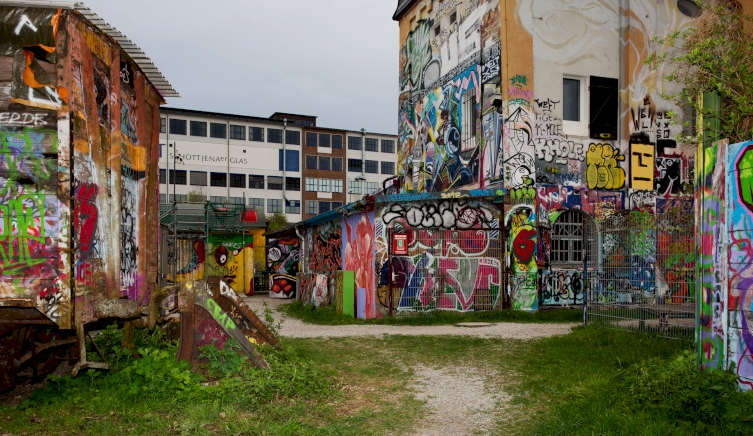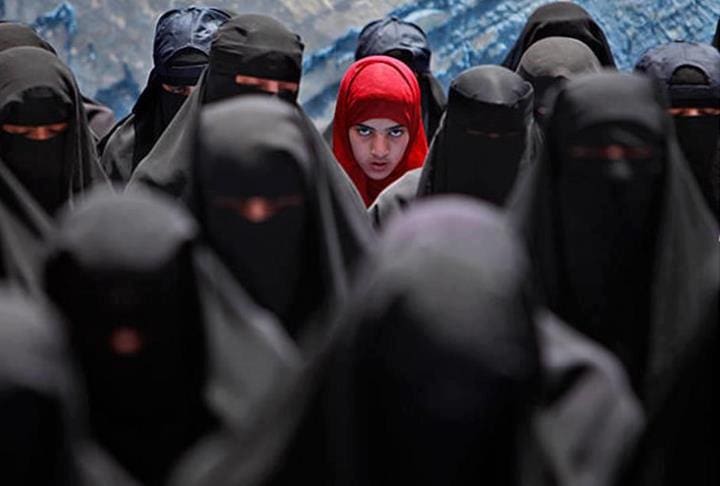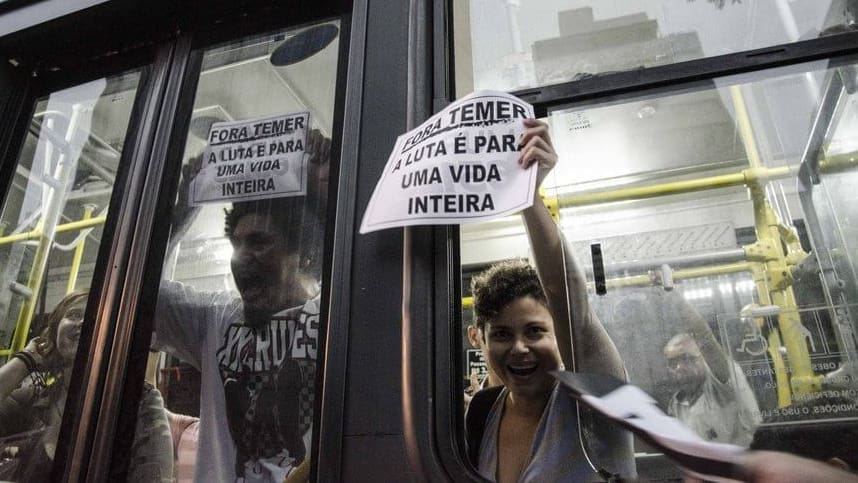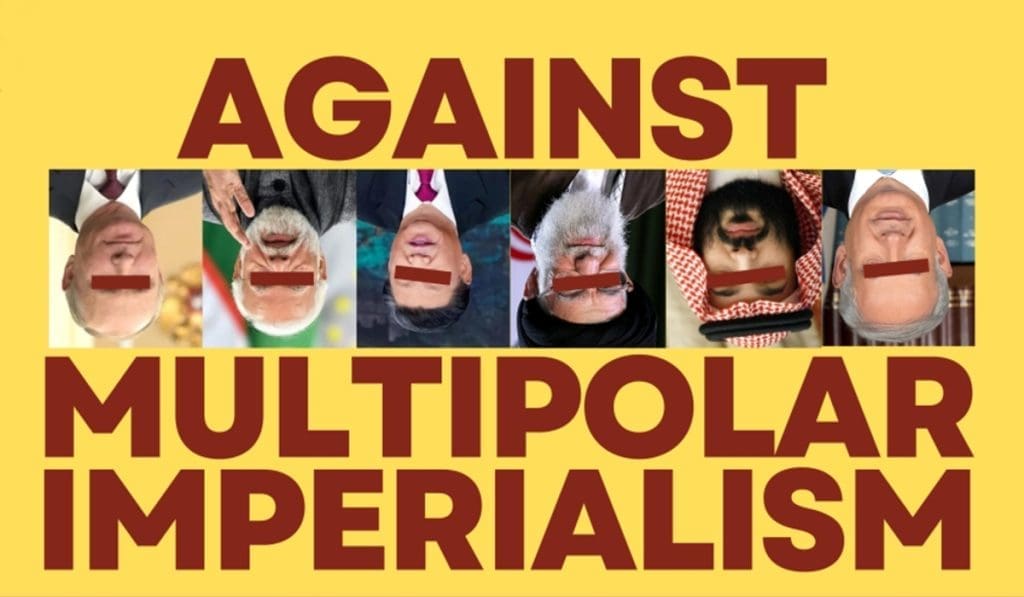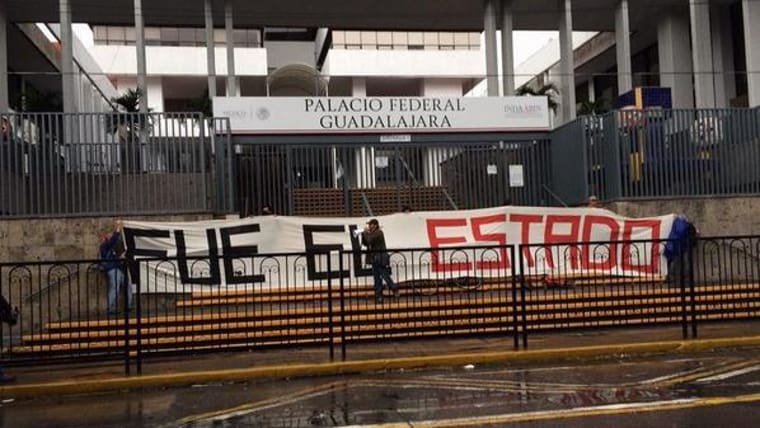“Antifa is indispensable.”
Interview with Katharina König
by Jan Jirát for Die Wochenzeitung (Switzerland)
20 April 2017 (original post in German)
In 1990s Jena, Germany, Katharina König and her friends experienced first-hand the aggressive hounding of neo-Nazis. These days she fights against the rightwing radical scene as a Thüringen state parliamentarian of the left party die Linke. She spoke to Jan Jirát, of [the left-leaning Swiss newspaper] Die Wochenzeitung (WOZ), about the importance of antifascist organizing in light of the Europe-wide swing to the right, and about the National Socialist Underground (NSU) serial murders in Germany.
Jan Jirát: Katharina König, you are from Jena, Thüringen, just like Uwe Mundlos, Uwe Böhnhardt, and Beate Zschäpe, core members of the National Socialist Underground, an organization which allegedly murdered ten people between 2000 and 2007. You are also from the same generation as the three. Did you know them before they went on the lam in 1998?
Katharina König: Yes, in the sense that we faced them in opposition. Everyone who engaged against the radical right in Jena during the nineties knew them. Mundlos, Böhnhardt, and Zschäpe were active in the local neo-Nazi scene that hunted leftists and antifascists starting in 1995.
JJ: Hunted?
KK: The leftwing alternative scene used to gather at the JG, the Junge Gemeinde Stadtmitte, a downtown youth center. That was one of the few places where Nazis weren’t allowed. Every Tuesday there would be a meeting that let out around ten p.m., and Nazis would be waiting around to ambush people on their way home. They would attack men with baseball bats; women would get lit cigarettes put down the front of their shirts and things like that.
JJ: How did you defend yourselves from these kinds of attacks?
KK: I had the advantage that I lived in the city center. People from farther-flung neighborhoods like Lobeda or Winzerla, where the NSU three were from, were under even more acute threat. Occasionally the JG would pay for someone to get a taxi. It was fundamental never to be out and about by yourself. When the attacks began, we also started to arm ourselves for protection. Some people got starter pistols; we also took self-defense courses and learned to yell, “Fire!” in case of an attack. People don’t respond when you yell “Help!”
JJ: Were you yourself ever attacked?
KK: Yes, several times. The first time, I was fourteen years old and three neo-Nazis attacked me after a football game, two men and a woman. The men held me down and the young woman went at my face with her combat boots. That’s where I got this scar under my eye. It was a targeted attack, because I’m Lothar König’s daughter. My father is a special object of hatred in the rightwing scene. He is a youth pastor and the director of JG Stadtmitte since 1990; he has been a vehement opponent of the neo-Nazis for a long time.
JJ: Did you go to the police?
KK: Yes, the next day. I even gave them the name of the woman who had beaten me; I knew her. There were never charges brought, let alone a conviction. The attack took place in broad daylight in front of the football stadium; a bunch of people were walking by and nobody did anything. This kind of deep ignorance and apathy around rightwing violence was typical in the nineties.
JJ: What explains that?
KK: Reunification led to large upheavals in former East Germany in the early nineties: high unemployment, economic restructuring, introduction of the D-mark, the sudden ability to travel anywhere. No one wanted to deal with this existing vileness. When the youth magazine of the Süddeutsche Zeitung reported on the neo-Nazi scene in Jena a couple years after the Fall, nobody in the city would hear of it: it was all, “There are no Nazis here!” and “We’re not rightwing!” This defensiveness could be explained by the fear that almost every East German city had of losing businesses and jobs to regional competitors.
JJ: That doesn’t sound like a very carefree adolescence.
KK: Strangely, it was, actually. We tend to forget what an exciting time it was. For example, we used to do things like set up a community kitchen in the middle of a traffic circle on a Sunday. Cars driving all around us, and we’re cooking soup over a campfire. The soup was awful, but the feeling of having taken over a piece of the city was really great.
JJ: You’re a lifelong, committed antifascist. At least in Switzerland, Antifa is regarded—even in wide swathes of the left milieu—as the left equivalent of the neo-Nazis. What does Antifa mean, for you?
KK: It is the most authentic expression of the fight against the radical right. Its resistance to neo-Nazis as well as rightwing conservatives doesn’t just come from a gut feeling. It is based on a principle of historical awareness of what it means to give space and power to the right. One very important practice within Antifa is research; no one knows more about rightwing structures than the Antifa. That’s why I always say to journalists: you should believe what the Antifa tells you.
JJ: For many, the Antifa is nothing more than a leftist gang.
KK: I’ve described to you the situation in 1990s Jena. And we knew even before the NSU that neo-Nazis don’t shy away from killing people. Violence is part of their ideology. It’s nice that people think Nazis can be reasoned with. And when people write “Jena is colorful” on the streets with chalk. It’s not enough, though. I am convinced that Nazi activity has to be confronted, and limits imposed. One example: in Rostock-Lichtenhagen in 1992 there was a sustained neo-Nazi assault—over several days—on a refugee shelter. The police eventually withdrew, as hundreds of onlookers applauded and egged on the neo-Nazis. Antifascists from all over Germany put their lives on the line to resist, and saw to it that the people in the shelter didn’t get lynched.
JJ: Still, even Antifa can’t always protect the migrant community in Germany, as the NSU serial murders demonstrated.
KK: That is unfortunately true. Antifascists could have figured it out after the nailbomb on Keupstrasse in Cologne in 2004. The residents there, mostly with migration backgrounds, were saying then that it was neo-Nazis who did it. Same goes for Kassel in April 2006, where after the murders of Mehmet Kubaşik and, shortly after, Halit Yozgat, there was a demonstration of several thousand people organized within the migrant community under the slogan, “No Tenth Victim”. The series of murders exposed a blind spot in antifascist work: the movement, led admittedly by white Germans, completely ignored migrants’ knowledge of rightwing extremist structures. I include myself in this criticism. This is one important lesson of the NSU murders: there has to be interchange with the migrant community.
JJ: You are one of the most well-known antifascists in Germany. Does it engender any specific reactions within the Nazi scene that you are a woman?
KK: First, I’m the daughter of Lothar König. Second, I use my official position as a state parliamentarian continually to expose neo-Nazi structures and the names of active neo-Nazis. And finally, a strong, self-possessed woman has no place in their ideology. At demonstrations, I hear things like, “That’s not a woman. She doesn’t have a woman’s figure or a woman’s face, or any man who would be interested in her.” By insinuating that I’m not a woman but an object, a beast, or a witch, what they are really saying is: she can be killed.
JJ: Last fall a Swiss neo-Nazi band called for your murder.
KK: When that went public, Monchi, the singer in the antifascist band Feine Sahne Fischfilet called me up and said, “Katharina, I’m a singer myself and I write songs. Someone doesn’t just write something like that for no reason. There is a lot of heart and power in a song. Don’t take this lightly.” And I don’t, but what is the alternative? I think it would be much worse to change my behavior because of a song or some hatemail. That would be the Nazis getting what they wanted.
JJ: Do you still carry the old starter pistol on you?
KK: No. I stay safe now by not taking the train alone at night. The trip from Saalfeld (where my local offices are) to Jena goes past Kahla, a Nazi town. Other than that, I find that being public is in itself the best protection.
JJ: What is a Nazi town, exactly?
KK: A city where there is no perceptible public challenge or resistance to neo-Nazis, where a majority responds to them with either apathy or fear. In Kahla, neo-Nazis own several buildings, which leads to further establishment and entrenchment of their structures. They have hounded anyone engaged in anti-rightwing activities so relentlessly that many have had to leave town.
JJ: How can a city turn that around?
KK: Until pretty recently there was no police station in Kahla. Now, it no longer takes twenty minutes but only five before law enforcement arrives on a call. They run patrols. This kind of low-level repression can help to reduce the overall feeling of powerlessness. But it’s not enough. In order to strengthen civil society in town, there have to be alternative spaces—especially for young people—to meet: youth centers, cultural centers, church groups. This takes money and time.
JJ: Are there positive examples where neo-Nazis have been run out of town altogether?
KK: Jena is a good example. After the rough-going nineties, there was a transformation. In 2000, after an arson attack on a synagogue in Düsseldorf, chancellor Gerhard Schröder called for a nationwide Aufstand der Anständigen [revolt of the respectable]. Suddenly politicians and artists began taking a clear stand against neo-Nazis; social movements emerged. Antifascism became almost mainstream. When there was a neo-Nazi Fest der Völker [Peoples’ Festival] here in Jena in 2005, eight thousand people took to the street in protest. A blockade was erected at 4:30 a.m. on the square where the rightwing rock party was supposed to take place. It was a great mix of people: antifas, high school students, politicians even from the CDU [the center-right Christian Democratic Union party of Angela Merkel], church members…the Nazis had to have their party on the edge of town instead. That victory helped cement a broad-based movement.
JJ: Has this alliance held up?
KK: To a large extent, yes. Jena today is a leftwing and alternative kind of town. There is still criticism of Antifa, but people don’t hold it at arm’s length anymore. It is no longer regarded as a part of the problem, but part of the solution. People know who is doing the research and educational work around the rightwing scene. They know who has been organizing and attending the protests for two decades. In contrast, elsewhere in Thüringen: in Erfurt, the state capital, when Alternative für Deutschland announces a demo, they bring thousands of supporters into the streets, and there will be maybe five hundred counterprotesters.
JJ: You mentioned the antifascist band Feine Sahne Fischfilet. Their current album, Bleiben oder Gehen, is about how in Berlin, Antifa is a lifestyle whereas in a town in Mecklenburg-West Pomerania, it is a fight for survival.
KK: This is an important point. Some Saalfeld antifascists live in a constant state of acute threat. Their addresses are passed around in the neo-Nazi scene. In the fall of 2015, there were a couple neo-Nazi attacks, one after the other, on young women. These women have been left to deal with it more or less on their own. Maybe a couple people come over from Jena, but that’s it. It is not enough to do good research and publish smart articles on the internet. Concrete solidarity is important too. But instead of going around the corner to Saalfeld, people would rather drive up to Hamburg for the G20 protests. That doesn’t change the fact that the everyday is at least as important as the “Class Reunion” in Hamburg. If there is no support for antifascists in places like Saalfeld or Kahla, the people trying to defend themselves there will eventually say, “I can’t do it anymore.” That’s what we have to prevent.
JJ: How did you, as an antifascist, end up joining die Linke and taking up parliamentary politics?
KK: It’s a long story. On New Year’s 2003 I was in Israel, and I got a call at two o’clock in the morning: people from the Aktionsbündnis gegen Rechts [Alliance in Action Against the Right] in Jena, a group I’ve belonged to since the mid-nineties. Nobody was sober. “Katharina, we need women!” they said. “Okay, um, what for?”
“There are local elections in Jena, and we’re launching a citizens’ initiative, are you in?” I said yes, mostly just for fun. And at first that’s what it was. We founded die Neue Mitte, [the New Center], made up of the ÖKS, Ökologisch-Kulturelle Socialisten [Eco-cultural socialists], the SOFF, Soziale Friedensfront [Social Peace Front], the BAF, Bürgerlich-Anarchistische Front [Bourgeois Anarchist Front], and the ALK, Autonomes Linksradikale Kommando [Autonomous Radical Left Command], of which I was a member. The local media took it totally seriously. So much so that the Greens started to fear they wouldn’t reach the five percent threshold and they offered us slots on their list. Die Linke (then they were still called Partei des Demokratischen Sozialismus [PDS]) offered the same. Suddenly my name was in the third slot on the PDS list, and I ended up on the Jena city council.
JJ: And in 2009 there was the shakeup in the Thüringen state government. Now you sit on the committee there that is concerned with the NSU proceedings. The committee has access to classified investigation files and secret surveillance documents. What kind of insights have you gained?
KK: Above all I’ve gotten a look into the inner workings of the justice system and the domestic intelligence services. As for insights into the neo-Nazi scene, I still consider Antifa the most reliable source. Federal law enforcement relies on undercover informants—in other words, people in the scene themselves who they give money in exchange for information. This is a practice which, in my view, should be declared a colossal failure given what has come out of the NSU investigations, especially in Thüringen. The most important undercover informant that Thüringen law enforcement had was Tino Brandt, and he evidently used the money he got for his snitching to further build up neo-Nazi structures—structures in which the NSU three used to move, before they went underground in 1998. That the NSU eventually exposed itself [and thus the government agents it was riddled with] did not lead to the abolition of the use of undercover informants or even to a basic debate over federal law enforcement tactics. Quite the contrary: the Bundesamt für Verfassungsschutz [basically the German FBI] has come out of the NSU investigations even stronger—more authority, more personnel, and more favorable legal frameworks to act within.
JJ: How is that possible?
KK: There was a brief window at the end of 2011, after the NSU came into the sunlight, when restrictions on or even the abolition of the BfV could have happened. The manifold entanglements of government agents within the NSU complex had been made public, and it was a scandal. But the political pressure was too slight. Besides that, in light of the current state of the world and the threat of terrorism, it wouldn’t be acceptable to a majority to completely dissolve the domestic intelligence service. And ultimately, to dissolve the BfV would have been an admission of policy failure.
JJ: Angela Merkel’s promise of a conclusive investigation seems to be what has dissolved instead; many questions around the NSU complex remain open. The federal attorney general’s office still operates on the assumption that the NSU consisted only of Zschäpe, Mundlos, and Böhnhardt, even when all evidence points to the three getting support from the whole scene.
KK: I believe that Angela Merkel meant what she said. But apparently not even the chancellor was fully aware of just how independently this branch of law enforcement operates, or how they will move mountains to obstruct and delay to keep anyone from gaining any insight into their activities. Still today there is no independent and sovereign body going over all the files and documents of the various investigative committees and weighing it all together. The federal committee could do that, but it simply doesn’t have the resources. And in the next parliament, there won’t be a federal committee looking into the NSU affair at all anymore, I would bet a thousand euros.
JJ: At the end of September there are federal elections. Wouldn’t that be something for you? A transfer to Berlin?
KK: For god’s sake, no! What would I do there? It’s already difficult enough for me to sit in the state parliament in Erfurt. That’s already far enough away from the structures of extraparliamentary opposition that I belong to. I want to stay here in Jena and Saalfeld.
Katharina König (39) was born in Erfurt, daughter of pastor Lothar König, and grew up in Jena. After a year of volunteer work in Israel, she studied Semitic philology, Islamic and political science, and social work in Jena. She was a social worker from 2002 to 2009; in 2004 she was elected to the Jena city council for the PDS (now die Linke). In 2009 she moved up to the Thüringen state parliament.
More on the NSU Complex:
Enver Şimşek, Abdurrahim Özüdoğru, Süleyman Taşköprü, Habil Kılıç, Mehmet Turgut, İsmail Yaşar, Theodoros Boulgarides, Mehmet Kubaşık, Halit Yozgat, Michéle Kiesewetter: these are the names of the alleged victims of the National Socialist Underground (NSU). The accused perpetrators of this series of murders between 2000 and 2007 are Uwe Mundlos and Uwe Böhnhardt; Beate Zschäpe is implicated as an accomplice.
The rightwing terrorist organization NSU came to public light in November 2011 when Mundlos and Böhnhardt allegedly shot themselves after a botched bank robbery in Eisenach, Thüringen—after fourteen years underground. After the organization’s exposure, at first Zschäpe tried to duck out of sight but ultimately turned herself in to the police. Since May 2013 she has been standing trial in Munich. Officially, this core trio of the NSU is widely regarded as an isolated cell; nevertheless there are extensive indications of a broader network of support within the neo-Nazi scene.
There are also several connections of the NSU complex to Switzerland, which haven’t gotten much media attention:
- On 11 April 1998, Thürigen state law enforcement intercepted a telephone communication out of Concise, a town in canton Vaud. The caller, allegedly, was Mundlos, contacting a supporter in Jena several months after going on the lam. On the same day, there was a neo-Nazi concert in Concise with about 300 attendees. To this day, possible connections of the NSU trio to active neo-Nazis in French Switzerland have not been thoroughly investigated.
- The same Česká handgun was used in all ten murders of which the NSU is accused. The weapon allegedly came to Jena—first in the milieu of organized crime, then in the local neo-Nazi scene, and from there to the NSU three—by way of a Hans-Ulrich M., the Swiss person in whose name it is registered. He had been friends since the early nineties with an Enrico T., who was criminally active in Jena and knew Böhnhardt. It still hasn’t been fully explained how the handgun got to the NSU three.
- Ralf Marschner, a.k.a. “Primus”, was an undercover informant in the neo-Nazi scene around Zwickau in Saxony from 1992 until 2002. According to research done by Die Welt, he employed Mundlos at his construction company in the early 2000s. In 2013, “Primus” was exposed as an informant, although he had already gone underground at some point before that—escaping to Switzerland, where he still lives. He has been questioned by criminal investigators, but he has never had to testify in any NSU proceedings. Switzerland denied his extradition to Germany (for improper bankruptcy filings) in 2016.
—Jan Jirát
Translated by Antidote
Featured image: the Kassablanca social center in Jena, Germany. Credit: Anne Morgenstern/WOZ

